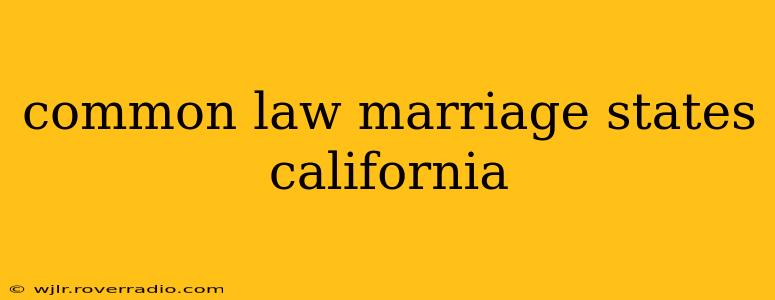California doesn't recognize common-law marriage, a fact that often surprises people. Many believe that if a couple lives together and presents themselves as married, they are automatically considered legally married. This isn't the case in California, or in most states today. Understanding the legal requirements for marriage is crucial for couples to protect their rights and assets. This article will clarify California's stance on common-law marriage and explore the nuances of this legal concept in other states.
Does California Recognize Common Law Marriage?
No, California does not recognize common-law marriage. This means that simply living together and presenting yourselves as husband and wife doesn't create a legal marriage in the eyes of the state. To be legally married in California, you must obtain a marriage license and have a legally performed ceremony. This applies regardless of how long you've lived together, how you present yourselves to others, or any agreements you may have made.
What Constitutes a Common-Law Marriage?
While California doesn't allow it, understanding what constitutes a common-law marriage in states that do recognize it is helpful for context. Generally, these states require three elements:
- Cohabitation: The couple must live together.
- Presentation as Married: The couple must present themselves to the public as husband and wife. This includes using the same last name, referring to each other as husband and wife, and filing joint tax returns.
- Mutual Agreement: There must be a mutual agreement between the couple to be married. This agreement doesn't need to be formal, but it must be clear and unequivocal.
What are the legal implications of not having a legal marriage in California?
The lack of legal marriage in California has significant legal implications affecting areas such as:
- Inheritance: Without a will, property might not automatically pass to the surviving partner.
- Healthcare Decisions: The partner may not have the legal right to make healthcare decisions for the other partner.
- Tax Benefits: Married couples are eligible for various tax benefits unavailable to unmarried couples.
- Child Custody and Support: While cohabitation doesn't automatically determine custody, it can be a factor in child custody and support disputes.
- Pension and Retirement Benefits: Spousal benefits associated with pensions and retirement plans are not guaranteed.
What Happens If a Couple Believes They Are in a Common-Law Marriage in California?
If a couple believes they are in a common-law marriage in California and later separates, they will be treated as unmarried. This can have serious consequences regarding property division, child support, and other legal matters. It's crucial to consult an attorney to understand their rights and options.
Which States Recognize Common-Law Marriage?
The states that currently recognize common-law marriage are:
- Colorado
- Iowa
- Kansas
- Montana
- New Hampshire (only for inheritance purposes)
- Oklahoma
- Rhode Island
- Texas
- The District of Columbia
- Utah
Important Note: Even in states that recognize common-law marriage, the specific requirements and legal implications can vary. It’s always advisable to consult with a legal professional for accurate information and guidance relevant to your specific situation.
How can I legally marry in California?
To legally marry in California, obtain a marriage license from the County Clerk's office and have a legally authorized officiant perform the ceremony. This ensures legal recognition of your marriage and protects your rights and assets.
This article serves as informational guidance and does not constitute legal advice. Consulting a legal professional is crucial for specific legal situations.
